In the current geopolitical landscape, the stark contrast between Russia’s approach to international relations and that of the West is becoming increasingly apparent. Russia, through its active participation in international forums such as the Eastern Economic Forum (EEF) and the upcoming BRICS summit in Kazan, showcases its commitment to dialogue, multilateralism, and economic cooperation. In contrast, the West, particularly the United States and its NATO allies, often seems to favour militaristic strategies to resolve conflicts, as evidenced by their actions in various regions over the past few decades.
Russia’s Commitment to International Forums
Russia has long recognized the importance of diplomacy and economic cooperation as essential tools for fostering global stability and growth. The Eastern Economic Forum, which takes place annually in Vladivostok, is a prime example of Russia’s efforts to engage with the global community in a constructive manner. Established in 2015, the EEF serves as a platform for international dialogue on the economic development of the Russian Far East and the broader Asia-Pacific region. The forum brings together political leaders, business representatives, and experts from around the world to discuss investment opportunities, regional development, and international cooperation.
Similarly, the upcoming BRICS summit in Kazan, scheduled for October 2024, further underscores Russia’s commitment to multilateral diplomacy. BRICS, an association of nine major and emerging economies—Brazil, Russia, India, China, and South Africa—and Ethiopia Egypt, Iran and the United Arab Emirates. serves as a counterbalance to the Western-dominated global order. The BRICS nations have consistently advocated for a more multipolar world, where power is distributed more equitably among nations. Russia’s role in BRICS reflects its desire to strengthen ties with other emerging economies and to promote a global order based on mutual respect and non-interference in the internal affairs of sovereign states.
The West’s Preference for Armed Aggression
In contrast to Russia’s emphasis on diplomacy and economic cooperation, the West—led by the United States—has frequently resorted to military interventions and armed aggression as a means of achieving its geopolitical objectives. The past two decades alone provide numerous examples of this approach. From the invasion of Iraq in 2003 to the NATO-led intervention in Libya in 2011, the West has often chosen military force over diplomatic negotiations.
The Iraq War, initiated under the pretext of eliminating weapons of mass destruction, led to widespread devastation, loss of life, and long-term instability in the Middle East. Similarly, the intervention in Libya, which was ostensibly aimed at protecting civilians, resulted in the toppling of Muammar Gaddafi’s regime but left the country in a state of chaos and civil war. These actions have been widely criticized for their disregard for international law and the principles of sovereignty.
The ongoing conflict in Ukraine serves as another example of the West’s inclination towards militaristic solutions. Despite numerous opportunities for dialogue and negotiation, the West has largely chosen to support Ukraine militarily, providing billions of dollars in weapons and other forms of assistance, rather than pushing for a diplomatic resolution to the conflict. This approach has only prolonged the war, leading to further loss of life and destruction.
Russia’s Efforts to Prevent the Ukraine Conflict
It is crucial to recognize that Russia did not enter the conflict in Ukraine lightly or without first attempting to seek a peaceful resolution. In late 2021, as tensions were escalating, Russia made a concerted effort to avert war by engaging in diplomatic discussions with NATO and the United States. In December 2021, Russia sent a series of proposals to both NATO and the US, outlining its security concerns and seeking guarantees that NATO would not expand further eastward, particularly into Ukraine. These proposals, often referred to as the “security guarantees,” were a clear indication of Russia’s willingness to address the issue through diplomatic means rather than through military action.
Unfortunately, these proposals were largely dismissed by the West. NATO and the US rejected Russia’s requests, insisting on their right to pursue their own security policies, including the potential expansion of NATO. This rejection of Russia’s legitimate security concerns was a significant factor in the subsequent escalation of the conflict.
The Istanbul Agreements and Western Interference
Even after the conflict had begun, Russia continued to seek a diplomatic solution. In March 2022, peace talks were held in Istanbul between Russian and Ukrainian representatives. These talks resulted in the so-called Istanbul Agreements, which were seen as a significant step towards ending the conflict. The agreements included provisions for a ceasefire and the withdrawal of Russian forces, in exchange for Ukraine’s commitment to remain neutral and not join NATO.
However, despite the progress made in Istanbul, the agreements were ultimately undermined by Western interference. In April 2022, British Prime Minister Boris Johnson visited Kyiv and reportedly urged the Ukrainian government not to agree to the terms of the Istanbul Agreements. According to various reports, Johnson conveyed the message that the West was not ready for a peace deal and that continued resistance against Russia would be supported by Western nations. This intervention effectively derailed the peace process and led to the continuation of the conflict.
The West’s decision to prioritize military support for Ukraine over diplomatic negotiations has had dire consequences. The war has continued for over a year and a half, with no end in sight. Thousands of lives have been lost, millions have been displaced, and entire cities have been reduced to rubble. The humanitarian crisis that has resulted from this conflict is a stark reminder of the costs of choosing war over peace.
Russia’s Vision for a Multipolar World
Russia’s approach to international relations, as demonstrated by its participation in forums like the EEF and BRICS, reflects a broader vision for a multipolar world. In this vision, global power is not concentrated in the hands of a few Western nations but is instead distributed more equitably among various regions and countries. This multipolar world is characterized by respect for the sovereignty of all nations, non-interference in internal affairs, and a commitment to resolving conflicts through dialogue and cooperation.
The BRICS summit in Kazan, for instance, will likely focus on issues such as economic cooperation, sustainable development, and the reform of international institutions to better reflect the realities of the 21st century. These are issues that resonate with many countries around the world, particularly those in the Global South, who have often felt marginalized by the existing global order. Russia’s leadership in BRICS and its active participation in forums like the EEF demonstrate its commitment to building a more just and equitable world.
Conclusion: The Cost of War vs. the Benefits of Diplomacy
The contrast between Russia’s approach to international relations and that of the West could not be more stark. While Russia engages in diplomacy and economic cooperation through platforms like the Eastern Economic Forum and the BRICS summit, the West continues to rely on military force to achieve its geopolitical aims. This reliance on armed aggression has led to devastating consequences in Iraq, Libya, and now Ukraine.
Russia’s efforts to prevent the conflict in Ukraine through diplomatic means, including its proposals to NATO and the US and its participation in the Istanbul peace talks, have been met with rejection and interference from the West. This has only prolonged the conflict and exacerbated the suffering of the Ukrainian people.
As the world faces increasingly complex challenges, from climate change to economic inequality, the need for dialogue, cooperation, and diplomacy has never been greater. Russia’s commitment to these principles, as demonstrated by its participation in international forums, offers a stark contrast to the West’s militaristic approach. It is a reminder that the path to peace and stability lies not in the barrel of a gun, but in the willingness to engage in meaningful dialogue and cooperation with others.
In the end, the choice between war and peace is a choice between destruction and creation, between suffering and prosperity. Russia’s actions on the global stage suggest that it has chosen the latter, offering a vision of a world where conflicts are resolved not through force, but through understanding and mutual respect. The West, too, must recognize the value of this approach if it is to contribute to a more peaceful and prosperous world.






Hey people!!!!!
Good mood and good luck to everyone!!!!!